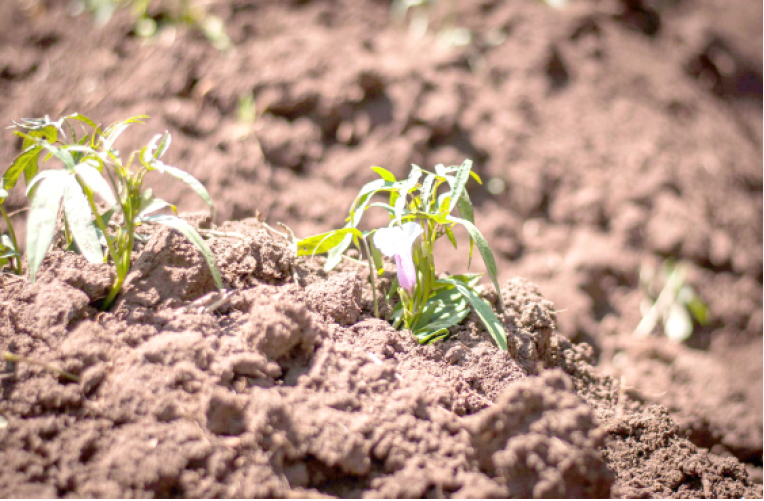World Soil Day: Soil degradation heightens Nigeria’s food insecurity
Today, Nigeria is joining the rest of the globe to celebrate the World Soil Day which is set aside every year by the United Nations to draw global attention to the continued decline of soil quality and efficiency, already negatively impacting on the productivity of millions of smallholder farmers. This year’s theme is ‘Stop Soil […]

Soil is said to be fast losing its quality as experts brainstorm on the way forward
Today, Nigeria is joining the rest of the globe to celebrate the World Soil Day which is set aside every year by the United Nations to draw global attention to the continued decline of soil quality and efficiency, already negatively impacting on the productivity of millions of smallholder farmers.
This year’s theme is ‘Stop Soil Erosion, Save Our Future.’
According to the United Nations, every five seconds, the equivalent of one hectare of soil is eroded and the situation is now becoming alarming as the world population and demand for food grow.
Soil degradation includes erosion, soil pollution, inappropriate use of fertiliser, depletion of organic carbon, nutrient imbalance, climate change, desertification and loss of biodiversity, among several other factors which affect soil efficiency.
Many farmers who spoke with Daily Trust said the output from the same land size 30 years ago is no longer the same today.
“The soil is dead,” Audu Ibrahim told this reporter. “In 1984 up to 1996, if you saw the amount of maize I harvested here without applying fertiliser, you will be surprised. Today, I have to apply fertilizer twice, yet, the output is not something that one can be proud of,” the 61-year-old added.
On the outskirts of Keffi, Nasarawa State, a middle-aged man, Mr Danlami Ayuba, said growing certain crops like maize, rice and other grains in the area without fertiliser or animal manure is now impossible because the soil can no longer support the crops.
“Every year, we struggle with it. Some of our relations have moved to new places to look for fertile lands but for some of us here, productivity is declining,” he said.
Ibrahim and Ayuba’s unpleasant situations reflect the experiences of millions of Nigerian smallholder farmers with the declining productivity of their soil, particularly in the northern part of the country.
The danger ahead
“Soil degradation in sub-Saharan Africa is believed to be expanding at an alarming rate, accompanied by the lowest agriculture and livestock yields,” says the Global Soil Partnership’s policy brief on ‘Sustainable Soil Management for Food and Nutrition Security in Sub-Sahara Africa’ under the umbrella of the Food and Agricultural Organisation (FAO) of the United Nations.
FAO, while speaking on ‘Boosting Africa’s Soils’, expressed worry that “soil erosion in sub-Saharan Africa is considered one of the root causes of stagnating or declining agricultural productivity.”
The UN agency warned that “unless these problems are addressed, many parts of the continent will suffer increasingly from food insecurity.”
Professor Ayoade Ogunkunle, president of Nigeria Institute of Social Science (NISS), in a telephone interview with Daily Trust, said the damage done to soil was so enormous that it cannot be allowed to continue “if really we are serious about food security.”
He said soil degradation, which is the continuous destruction of the soil quality, has continued for many years in Nigeria and nobody was doing anything about it, adding that “unless we have the backing of the government, we cannot do much.”
“If the soil is destroyed, it will be so difficult to bring it back. Soil is not renewable in the foreseeable time that man lives after you destroy it. It’s better to manage, preserve and prevent it from destruction,” Professor Agunkunle said.
President of the Nigeria Society of Soil Science, Professor Bashiru Raji, said apart from desertification, soil erosion is the major factor that brings about soil degradation adding, “If we stop soil erosion, definitely, the soil will still serve us in other ecosystems services.”
Professor Raji noted that 2019 theme was apt because all types of erosion were threatening the entire ecosystem and destroying the nation as it did to Mesopotamian (in Iraq) and Egyptian civilizations.
“Sheet erosion, which is present in every part of the country, is also a major theft of soil fertility because it removes the topsoil which is fertile and support crops,” he stated.
Problem demands a new approach
The president of NISS stated that shifting cultivation was no longer possible because the land for agricultural purpose is becoming smaller due to other competing demands hence the need for another approach for the maintenance of the fertility of the soil.
He said they have recommended procedure for sustainable land use management “that we need to give to extension workers to teach the farmers” because the wrong use of fertiliser can destroy the soil.
The experts also canvassed for sustainable country policy and investment on soil management system in the country.
Climate-smart agricultural practices and forestation must be encouraged and inculcated into the country’s soil policy for sustainable management.
The Federal Ministry of Agriculture and Rural Development said soil mapping for the six agro-ecological zones was to address the issues of soil-specific fertiliser but that work needed to be done in the area or farmers education for correct application.
